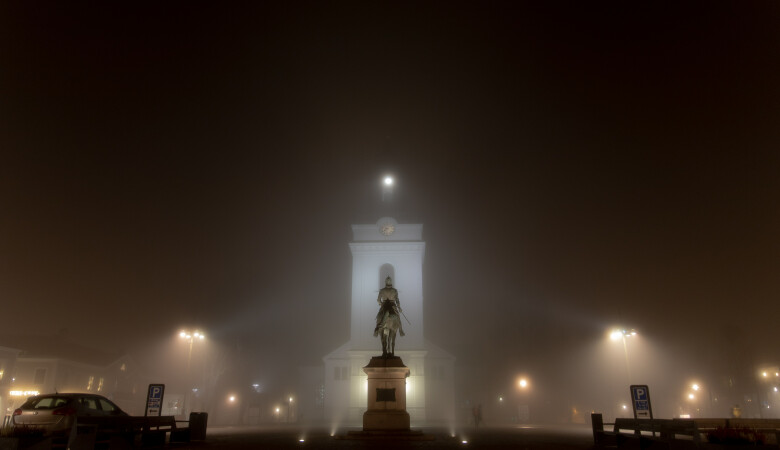Building Each Other Up (Romans Sermon 107 of 120)
July 09, 2006 | Andy Davis
Romans 14:19-23
Brotherly Love, Conscience
Introduction: Our Fascination With Building Projects
From the very beginning of human history, we have been fascinated by grand and glorious building projects. And the first example of this, of course, is the Tower of Babel, where we sought to build a stairway to heaven with state-of-the-art materials, for the praise and glory of our name and in defiance of God's command.
And that's gone on ever since then. You have the Great Pyramid of Cheops, one of the seven wonders of the ancient world, a marvel of human technology and precision still standing today. This has continued throughout every generation; every society, every grand and glorious society, seeks to have at least one noteworthy building that it can point to, whether the Roman Coliseum or the Great Wall of China or the Taj Mahal, people want a great and glorious building project that sums up the glory of the people, so that people can know just how great that society was. Even to the present day, there are people designing grand and glorious buildings for their own praise and glory.
I was reading a book about the architect Frank Lloyd Wright, who had a zeal and ambition for his own name, he desired to be the greatest architect in history. He's the one that designed Falling Water, that house that straddles a waterfall, it's really quite a remarkable piece of engineering and art. He also proposed in 1956 the building of a mile high skyscraper in Chicago, Illinois. Now, technology wasn't up to the task, but he had that kind of dream and that kind of vision.
I read recently about a project that's on the books in Japan, Tokyo, for the building of an incredible pyramid, the Shimizu Mega-City Pyramid. It's a monstrously huge thing that's going to be 12 times higher than the Great Pyramid of Egypt. It's going to reach over 2000 meters high. For those of you that are metrically challenged, that's about 1.25 miles into the sky. That's incredible, and it's going to house 750,000 people. It's going to have 30-story skyscrapers dangling from the inner structures, just hanging there like fruit on a tree and people are going to live there. They could actually spend their whole lives within that pyramid. The problem, of course, of space is acute in Tokyo and they want to build it out in the bay, and they're going to use carbon-reinforced nano tubes and all kinds of things. They think it's going to stand up against a tsunami, it's their version of a hurricane or an earthquake, or anything. This is the grand and glorious building project. And the statements that are made about this are quite remarkable, the boastful statements. They say it's going to be the greatest building project in human history.
Well, I say to you, it is not. Because all of these human building projects, all of them have something in common, they are all temporary, they're all built out of earthly stuff that the Lord says in Hebrews 1, he will roll up like a dirty garment and throw away when Jesus comes back to set up the new Heavens and the new Earth. But there is a human building project, built not with human hands, but by the power of God, that will last for all eternity, and it is the church of Jesus Christ, it is the temple of the living God that is being built by the power of God. It will last for all eternity.
And no, Frank Lloyd Wright is not the greatest architect in history, it is God himself who is the architect and the executor of that plan who is the greatest. He gets first place. God has been working on this plan, the plan for this building, since before the foundation of the world. God is the architect who drew up the plans, God is the builder who's executing the plan, God is the owner who will get all of the glory and he will dwell in it forever. God the Father gave the command, God the Son paid for it with His own shed blood on the cross, God the Holy Spirit Is executing it day by day with the advance of the Gospel, the preaching of the gospel all over the world. This holy structure, this temple of God is being built right before our eyes.
Now, this is the work that Paul has in mind in Romans 14. Now, I know you don't see it there, but if you know what to look for, it's there. It says in verse 19 we should "pursue the things that make for peace and the building up of one another." It says in the very next verse, "Do not tear down the work of God for the sake of food." And so Paul has in mind this building project.
I. God’s Magnificent Building Project: The Church
Now, what is the context of Paul's comments here in Romans 14? Well, Romans 14 is written to the church of Jesus Christ at Rome, which was a mixed assembly, Jew and Gentile together, worshipping Jesus Christ, loving Jesus Christ, but having some problems.
They were having some difficulties, and the problem was that they didn't know what to do with the Jewish lifestyle under the law of Moses now that they were in the new covenant. There were certain rules and regulations that in the past had separated Jews and Gentiles, but now the teaching had come and were obsolete. All foods had been declared clean, you didn't have to circumcise your boys on the eighth day, you didn't have to go to Jerusalem three times a year. The Sabbath had a different interpretation. It had been fulfilled now and it had been moved to the first day of the week. Things had changed, and it was hard for the Jews and the Gentiles to know how to get along, and so they started to bicker over debatable issues. They started to have conflicts over these kinds of things. And Paul is writing to the church at Rome, and he writes for about a chapter and a half about the need to maintain peace and not to bicker, and why? For the sake of this glorious, this grand and glorious building project that God's been on and continues to be on, this church that He's building.
Solomon’s Glorious Temple
Now, Solomon had built a glorious temple. We know about it, we read in the Old Testament, David had the idea to build a house for God, feeling perhaps a little guilty that he's sitting in a house of cedar when God's still in a tent, so he wants to build a grand and glorious house for God. God through the prophet Nathan says it's a good idea. You get full credit for it, but it's not going to be you to do it, because you're a man of blood, rather your son, Solomon, will be the one. And so God gave David the plans, he had given David so many of the resources, he stockpiled building materials, but it was his son, Solomon, that built that glorious temple.
Now, it was glorious, but it was small, relatively small. In 1 Kings 6:2, it says, the temple that Solomon, King Solomon, built for the Lord was 60 cubits long, that's 90 feet long, 20 cubits wide, that's 30 feet wide and 30 high, that's about 45 feet high, really is not all that impressive a structure, really not that grand. Our own sanctuary is larger in some dimensions, than that is. It was glorious, it was made of the highest quality materials, the artwork was exquisite, it was made of gold in many places or overlaid with gold. But for all of its glory, and for its size, it still was not glorious enough and too small to contain God. And so at its time of dedication, King Solomon said, "But will God really dwell on the earth, the heavens, even the highest heavens cannot contain you, how much less this temple that I have built."
Christ is Building a More Glorious Temple
And it was merely a shadow, a shadow of the reality that is Christ. Jesus is the reality, that temple was just a shadow of it, and it is now obsolete. It says in Hebrews 8:13 that the idea of having an earthly temple where we worship is obsolete. "By calling this covenant 'new,' he has made the first one obsolete and what is obsolete and aging will soon disappear." No, Christ is building a more glorious temple, he's building a glorious temple, a spiritual temple. Solomon's temple was made of earthly stones and bricks, and acacia wood and gold dug out of hills somewhere. But Christ's temple is spiritual, it's a spiritual dwelling place, where he will dwell with his people forever and ever.
Now, as it turns out, in the New Testament, as we read, we find that the people of God are the temple. We are the building materials for this temple. It's taught openly in Ephesians 2, and there in Ephesians 2, it's talking about the previous strife between Jews and Gentiles, how there were regulations that kept them apart, a dividing wall of hostility between them. But that's been removed now in Christ. We're in the New Covenant now and the two, Jew and Gentile now become one new man, Christian, a believer in Christ, and those old distinctions don't mean anything. And so Paul says in Ephesians 2, "In Christ Jesus, the whole building is joined together and rises to become a holy temple in the Lord. And in Him you too are being built together to become a dwelling in which God lives by His spirit." It's a spiritual temple He's building. He says the same thing in 1 Corinthians 3, he says there, "Don't you know that you yourselves are God's temple and that God's Spirit lives in you. If anyone destroys God's temple, God will destroy him, for God's temple is sacred and you are that temple."
It says in Hebrews 3:6, "Christ is faithful as a Son over God's house, and we are his house if we hold on to our courage in the hope of which we trust." And then 1 Peter 2, it says, "As you come to Him, the living stone, rejected by man, but chosen by God and precious to Him, you also like living stones are being built together to become a holy priesthood, offering spiritual sacrifices acceptable God through Jesus Christ." That's four different passages. This is not a minor theme in the New Testament, but rather a major one. We are being built together to become a dwelling in which God lives by His spirit.
Ongoing Construction for Millennia
Now, this is an ongoing construction project. It's not finished yet. Jesus has been working on it now for 2000 years. Remember how He said the night before He was crucified in John 14, "Do not let your hearts be troubled. Trust in God, trust also in Me. In my father's house are many rooms. If it were not so, I would have told you for I am going there to prepare a place for you. And if I go and prepare a place for you, I will come back and take you to be with Me so that you also may be where I am." Now, what's interesting is Jesus says He's going to go there to prepare a place for us. But if you put the whole thing together, it seems he's every bit as much preparing us to be the place. And so we're going there to the place He's preparing, but we are also being prepared to live forever as living stones in that temple. Isn't that exciting?
And so Jesus has been working on it, now working on us for 200 years. He's working on you, Christian friend, brother and sister in Christ, right now, polishing you up, shining you up, getting the rough edges off, and on me too, getting us beautiful, to be a fit dwelling place where He will live for ever and ever. What an exciting thought that is. The dwelling place Christ has been working on for all human history is this very one. It says in Revelations 3:12, "To him who overcomes I will make a pillar in the temple of my God. Never again will he leave it."
What's so fascinating in the Book of Revelation, not only are we going to be a dwelling place for God, but He also a dwelling place for us, and so there's a perfect unity in that way. We will be one with God. And so it says in Revelation 21:3, "And I heard a loud voice from the throne saying, 'Now the dwelling of God is with men, and He will live with them, they will be His people, and God Himself will be with them and be their God.'" And it says later also in Revelation, "I did not see a temple in the city, because the Lamb of God is the temple." It's a beautiful picture of unity and oneness, the people of God and God himself.
II. God’s Fellow-Builders
Now, that's the building project. We are God's fellow builders. We are in construction with Him, we are given a role to play in which we are building this eternal structure, and that's exciting isn't it? God has ordained for us to be fellow workers with him in this grand and glorious building project. 1 Corinthians 3:9 says, "We are God's fellow workers. You are God's field, you are God's building." That's an incredible thought, to be laboring side-by-side with God on the eternal building in which we're all going to live.
Now, in Romans 14:19 it says, "So then we pursue the things that make for peace and the building up of one another." That's in the New American Standard, or mutual edification, a building up of one another. We're going to do everything we can, we're going to pursue whatever it takes for peace and for mutual edification. Verse 20, it says, "Do not tear down the work of God for the sake of food." And so this edification is going on. We are his fellow workers. How do we do it? By evangelism, by leading new people to faith in Christ, a new living stone is cut and put into the place in the wall that only it can fit into through eternal election. We are going to be involved in evangelism and in discipleship. As I mentioned a moment before, the beautification of these living stones that are already set in place. But they are being sanctified, they're being purified, they're being fit more and more for the holy habitation of God that's going on, and especially through the use of spiritual gifts. As we use our spiritual gifts, as the flow of the spiritual gifts goes in the body of Christ, this building is rising and getting stronger and more and more beautiful.
We've already had that teaching in Romans 12:6, "We have different gifts according to the grace given us." The spiritual gifts are given for the building up of the body of Christ. Ephesians 4, it says, "It was He who gave some to be apostles some to be prophets, some to be evangelists, and some to be pastors and teachers, to prepare God's people for works of service, so that the body of Christ may be built up." The works of service build up the body of Christ, the pastor, teachers prepare the people to do the works of service, and that's what enables us to build up the body of Christ, moment by moment, until we all reach unity in the faith and in the knowledge of the son of God, and become mature, until the building project is finished.
So as we use our spiritual gifts, we are building up the church, and that is exciting, isn't it? You should never, as a Christian person, feel that your life is worthless, that your time is wasted, that there's nothing of value, no good work for you to do, here. You are working as a Christian, as you use your spiritual gifts, you are working on the only thing that will survive through to eternity, and that is thrilling, isn't it? That's something well worth doing. It says in 1 Corinthians 14:12, "Since you are eager to have spiritual gifts, try to excel in gifts that build up the church." And so the goal is that idea of edification.
Now, as it turns out, each one of us will be rewarded for our labor. God is noting how you're using your time. He is noting how you're using your spiritual gift. He observes everything and nothing escapes his notice. And so it says in 1 Corinthians 3, Paul uses the same building kind of imagery. He says, "Each one will be rewarded according to his own labor, for we are God's fellow workers. You are God's field, God's building. By the grace God gave me, I laid a foundation as an expert builder. And now other people are building on it. But each one should be careful how he builds, for no one can lay any foundation other than the one already laid, which is Jesus Christ. If any man builds on this foundation using gold, silver, costly stones, wood, hay or straw, his work will be shown for what it is, because the day will bring it to light. It will be revealed with fire and the fire will test the quality of each man's work. If what he has built survives, he will receive his reward." And so we're going to be rewarded for the way we use our time, we'll be rewarded for the way we are participating in this eternal spiritual building project.
III. The Ultimate Destroyer: Sin
Now, as we come to the end of Romans 14, we come to that great destroyer of this building project. And that great destroyer is sin. Sin is the ultimate opposer of this building project, this construction project. Sin is what destroys it, sin desecrated the temple, sin halts construction. Sin defiles and makes ugly the living stones that are already set in place, and so, sin is the enemy of the building project that God has us on. It's what I call satanic sabotage. You know what sabotage is? It's is the idea of somebody coming at night and undoing the work that was done, destroying it surreptitiously, trying to undo the construction work of God, and Satan is all about that kind of sabotage in this eternal building project. Now, there's a very great warning concerning this. In 1 Corinthians 3:17, it says, "If anyone destroys God's temple, God will destroy him, for you are the temple of God." Sin is the great destroyer. And so therefore we have to be constantly vigilant in the body of Christ, concerning sin in our own lives and in the lives of our brothers and sisters in Christ.
Jesus is very clear about this in Matthew 18:6-9. He says, "If anyone causes one of these little ones who believe in me to sin, it would be better for him to have a large millstone hung around his neck and to be drowned in the depths of the sea. Woe to the world because of the things that cause people to sin, such things must come, but woe to the man through whom they come." And then He says, "If your hand or foot cause you to sin, cut it off and throw it away. It is better for you to end your life maimed or crippled than have two hands and two feet and be thrown in the fire of hell. And if your eye cause you to sin, then gouge it out and throw it away. It is better for you to enter life with one eye than to have two eyes and be thrown into the fire of hell."
And so we've been looking at the problem of sin in Romans 14. And there's different types of sin that destroy the building project of God. There's the sin of legalism, in which we don't understand the gospel of God's grace, and we become harsh judges, pointing the finger at one another, the sin of legalism. But then on the other side, we saw the sin of license in which people are going beyond commands that God has given into open sin. That's a problem as well and that's a concern, but then even within those areas of Christian freedom, Paul is dealing with something else. There's the sin of not being concerned about the effect of our freedoms on somebody else. We could be using our freedoms, but somebody else is hurt by it, somebody's offended, they're led into sin as a result of watching us, and Paul is very, very clear about the danger of that. And so he gives us, in effect, a new definition of sin in verse 23. Look at it, it says there, "The man who has doubts is condemned if he eats because his eating is not from faith and everything that does not come from faith is sin." The very strong and clear warning against sin.
IV. The Major Effort: Maintaining Peace While Building
The major effort then in this building project is maintaining peace while building. Look at verse 19 again, "Let us therefore make every effort to do what leads to peace and to mutual edification," or building up of one another. The building is built when peacemaking brothers and sisters edify each other. The building makes no unity, or no progress, when there is strife and discord and disunity. And therefore, Paul calls on Christians to be diligent about maintaining peace so that mutual edification can go on.
He begins in verse 19 with the word "therefore." He says, "Therefore, let us make every effort to do what leads to peace." That causes to look back and, if you would, look at verses 17 and 18. He says, "For the Kingdom of God is not a matter of eating and drinking, but of righteousness, peace and joy in the Holy Spirit, because anyone who serves Christ in this way is pleasing to God and proved by men." The Kingdom of God is not about eating and drinking. It's not about legalistic rules and regulations, either. It's about righteousness, peace and joy in the Holy Spirit, and if you follow God in that way, if you serve Christ in that way, you will build the body of Christ. Therefore, let's do it. Let's follow what leads to peace and to the mutual building up of one another. That's the connection.
Now, it takes effort, doesn't it? I mean, let's face it, except for me, people are difficult to get along with. Sometimes very difficult. No, I shouldn't say that. I can be difficult, very difficult too. Please don't talk to my wife about it afterwards. Some other time you can talk. But there are some times that all of us can be difficult. Sin makes us challenging to one another and therefore it's going to take effort. You have to follow what leads to peace. There's a sense of pursuing it, because it isn't easy. The same teaching is in Ephesians 4, "Make every effort to keep the unity of the spirit through the bond of peace." It's not easy, because people are so difficult, also because Satan is active in sowing discord all the time.
Now, when I was growing up, I read a bunch of Greek myths, and I used to love those mythological stories. And there's a story about a gathering of all the gods and goddesses. But one goddess was left out, and it was goddess Eris of discord. She's the goddess of arguments and conflicts. Well, would you invite her to your party? So she wasn't invited, and she was very frustrated she wasn't invited, so she did what she does best, she decided is sow discord among the gods and goddesses, specifically among the goddesses. And so she rolls out an apple and on the apple it's written, "For the most beautiful." For the most beautiful, and so immediately three goddesses come forward, Hera, the queen goddess, and Aphrodite, the goddess of love, and Athena, the goddess of wisdom. The three of them are basically having a girl fight over this apple. They elect poor Paris, a mortal, to judge which of these three is the most beautiful. How would you like to be Paris?
Well, each one of them make offers to him, what they'll give etcetera, but Aphrodite offers him the most beautiful woman in the world, who is Helen of Troy. And he agrees and that starts the Trojan War. She is the goddess of discord, Eris. Well, it's a myth, it's just a story, but there is a god of discord, isn't there, and his name is Satan. He is always rolling the apple of discord into the church. Every local church struggles with discord, every local church struggles with disharmony. It's not easy to follow what leads to peace.
Among the deacons we were reading a book by Ken Sande called Peacemakers. It's a great book, and I would encourage it to you. It's just talking about the need that we have to maintain unity and the effort that it takes, and the way that we have to skillfully go to a brother that's sinned against us or that we have sinned against and work it out according to Matthew 5, Matthew 18, and the techniques it's going to take to maintain that peace. That's exactly what the Apostle Paul is talking about here, because Satan is the god of discord. Now, discord, disunity, stops the flow of spiritual gifts. People don't teach, people don't encourage, people don't give, they don't pray when there's discord and disunity. And so therefore, we've got to follow what leads to peace.
V. Is It Really Worth It? Choosing Not to Use Your Freedoms
Now, the issue here in context is the exercise of freedoms in debatable issues. The thing you have to ask is, is it really worth it? Is it worth it to you to press your freedoms? Is it worth it to you to press your advantages and the things that are given to you, that are your birth right as a Christian, if it's going to cause a brother or a sister to stumble?
Now, we Americans, we're used to our freedoms, talking about our rights, right? Right from the very beginning, July 4, 1776, the Declaration of Independence, Thomas Jefferson. "We hold these truths to be self-evident, that all men are created equal, and that they are endowed by their creator with certain... " What? Unalienable rights. Unalienable, huh? Rights? How about graces from God, how about gifts of God? I mean, we ought to meditate on what we truly deserve. You ought to think about that, think, "God, what do I really deserve for my sin?" And if you take it to its logical biblical conclusion, we all deserve to be in hell right now. And whatever suffering you're going through, whatever your trouble is right now, whatever you're going through, whether financial, physical, relational, job-related, whatever, ask yourself, if you were in hell would you take getting out of help for that or would you stay in hell and be there? Would you trade hell for what you're going through right now?
And I can't imagine an earthly situation that's worse than the lake of fire. And that's what we deserve. But we are used as Americans to talking about our inalienable rights. We have the Bill of Rights and the Constitution, we have the Miranda rights. Ever seen a police movie? "You have the right to remain silent. Anything you say can and will be used against you in a court of law," etcetera. We are used to being told what our rights are. Well, Christians have rights, too. We have freedoms that have been bought for us at a very high price by the blood of Jesus Christ.
The Book of Galatians talks about those freedoms. It's called the Epistle of Freedoms, and it's so important we recognize the freedoms we have as Christians. Paul is actually very incensed about these legalistic Judaizers that are crawling in there to try to spy out the freedoms they have in Christ Jesus and report them back to the authorities. He says in Galatians 5:1, "And though freedom that Christ has set you free. Stand firm then and don't let yourself be burdened again by a yoke of slavery." We are not going to be burdened by a yoke of religious legalism. We have freedoms, we have certain freedoms in Christ.
Paul is very strong in 1 Corinthians 9 about his freedoms as an Apostle. He says there, "Am I not free? Am I not an apostle? Have I not seen Jesus our Lord? Are you not the result of my work in the Lord? …And this is my defense to those who sit in judgment on me. Don't we have the right to food and drink. Do we have the right to take a believing wife along with us…?" And what about getting paid for ministry, "is it only I and Barnabas who have to work for a living?" He talks about the issue of receiving money for ministry, and he makes a whole theology of it. But then after having laid out his biblical rights to being paid for ministry, he then says this, "But we did not use this right. In fact, we put up with anything rather than to hinder the gospel of Christ."
Now, that's the spirit of Romans 14. I'm not going to press my rights. Yes, I have the right to eat, I have the right to drink, I have the right to do these free things. But if my brother or sister in Christ is going to be harassed by it or it's going to cause them to stumble in any way, I'm not going to press my rights, I'm going to refrain. And so it says in verse 20 and 21, "Do not destroy the work of God for the sake of food. All food is clean, that is true, but it is wrong for a man to eat anything that causes someone else to stumble." And then in verse 21, "It is better not to eat meat or to drink wine or to do anything else that will cause your brother to fall."
I think verse 21 is the most important verse I know in the Bible for my own view on Christians drinking wine. It's clear that Paul's arguing here, not about immoral or wicked things, but about things that are within the purview of Christian freedom, and yet he's thinking like a member of the body of Christ. And he's thinking, "What will be the effect of my behavior on someone else if they see me do this?" It's not worth it he says, in verse 21, "I is better not to eat meat or drink wine or do anything else that will cause your brother to fall." And so he says it's important that you find a way to keep your freedoms private. If you look at verse 22, and again, please don't misunderstand me. We're not talking about illicit or immoral things. Please understand we're talking about things that are matters of Christian freedom, not sin or wickedness, not that, but things that are free, that's what he's referring to here.
In verse 22, he says, "So whatever you believe about these things, keep between yourself and God. Blessed is the man who does not condemn himself by what he approves." Sometimes openly talking about your right to drink wine or to watch any DVD you want or play any computer game you want or wear any clothes you want, or live any free way you want is actually as damaging is openly doing it. So he says keep it between yourself and God, and don't flaunt your freedoms. And also don't forget to guard your own heart. Some things that start out as freedoms can actually lead you across a line in which you are definitely sinning. And little by little your heart has become hardened, you don't even notice what's happening. So guard yourself and let your brothers and sisters in Christ guard you as well, as we saw in Hebrews 3, in the new member time. Let's watch over one another in brotherly love, and watch over yourself too.
VI. Everything Not From Faith Is Sin
Finally, we get to this verse 23. "Everything that does not come from faith, is sin." He says, "The man who has doubts is condemned if he eats because his eating is not from faith and everything that does not come from faith is sin." If your faith isn't telling you yes, if it's telling you no, you're sinning, even if you find out later you had that freedom to do it. You can't go beyond your faith, you can't go beyond your conscience. I you know something's wrong and you do it, then it's wrong, it's sin. A violation of a conscience is a serious matter. It's a serious thing to do something that you know is wrong or that you have a sense is wrong or that's going to hurt somebody, that's a serious thing. Everything that does not come from faith is sin. Therefore, I would urge you to set that up as one of the filters of your life. We'll talk about that in a moment, an application, but you need to look at everything you do, and say, is this from faith, is this for the glory of God? Filter your life that way.
29:51 AD: Let me speak a word to the non-Christian. Do you know what this means? The number one religion in the world is salvation by good works. You go try to witness to somebody and their hope on Judgment Day is that their good works will outweigh their bad, or even if they don't, they'll be of such pure value that they'll overcome the sheer quantity of bad works. I don't know what it is. The theory of salvation by works is so interesting to me, because you know what Romans 14:23 does? How many good works does the unbeliever have? How many? None. Do you see that? It's not that their good works are going to outweigh their bad. It's that they don't have any, because they haven't done anything their entire life by faith in Jesus Christ for the glory of God. And therefore anything that does not come from faith is actually what? It's sin. All of their good works are, it says, "filthy rags," they're actually sins in God's sight. You can't do any good works until you come to faith in Jesus. And so salvation by works is impossible by this verse.
Now, how is sin a failure of faith? Let me ask you. Would you be doing that or behaving like that if Jesus were standing right there? Oh! Is your home ever suddenly changed by a phone call? You know what I'm talking about? You're in the middle of one of those family moments, you know what I'm saying? And the phone rings. "Hello, how are you? Oh, we're doing great, great, having a great day." Yeah, well, a moment ago, you weren't doing great, okay. So my question is, I believe a moment ago was a failure of faith, because Jesus was right there. He was right there. Not only was He right there, he's in us, we have Him living within us by the Spirit. All sin is a failure of faith, a failure of vision to see into the invisible world, and to see God on His throne.
Job put it this way, "I made a covenant with my eyes not to look lustfully at a girl, for what is man's lot from God above, his heritage from the almighty on high? Is it not ruined for the wicked and disaster for those who do wrong? Does He not see my way and count my every step?" Yes, He does. But you see, when you have a failure of faith you forget that. You forget that God is sitting on that fiery throne and His eyes are like blazing fire and He sees everything. Sin is a failure of faith and therefore turn it around. You want to grow in holiness? Build up your faith, build up your faith. See into the invisible, see the realm of the invisible, that there is a God who sees everything, that Christ is there, that Judgment Day is coming, that all of it's true. Well, how do you do that? Read the Bible and obey it, and feed your faith on the Scripture. Then you will see the invisible world that surrounds us at all time and you'll live a holy life.
VII. Application
Now, what do we say by way of application? Well, first, let the eternal building project be the center of your life. If you're a Christian, build the church. Do whatever you can toward peace and mutual edification. I would urge that you get Ken Sande's book, Peacemaker. If you know of anyone in this church right now that you're having a conflict with or somebody's having it with you or there's a difficulty, you need to obey verse 19 and follow what leads to peace, seek that person out, give them a call this afternoon, talk to that person, male or female, whatever, and say, "We need to get together. Let's talk something through. My heart's telling me that we're not where we need to be, we're not at peace. And therefore, the edification can't go on the way it needs to between us."
And so get with them, and it's not a easy. I have to do it frequently, more than I'd like, but it's needful. Make those calls, make that appointment and get together and build that relationship. Take sin seriously. Not just your own, but your brothers' and sisters', realize you're being watched all the time. And as you look at your life, say, "Is this by faith?" Anything that does not come from faith is sin. Ask, "Am I watching this movie by faith for the glory of God? Am I watching this ball game by faith for the glory of God? Am I eating this food or this quantity of food or this type of food by faith for the glory of God? Am I spending this money by faith for the glory of God? Am I playing this X-Box game by faith for the glory of God? Will I be pleased on Judgment Day that I spent my time this way, that I lived this way?" These are matters of Christian freedom but you have to ask if everything is done by faith for the glory of God.
And one final word to the unbeliever. I don't know who of you that are here have never made a commitment to Christ, but if you're clinging to the idea that your good works will save you, according to Romans 14:23, you have none, you have no good works and they cannot save you. But Jesus, His shed blood on the cross, he can save you, He can give you a gift of righteousness and salvation right now simply by faith. By trusting in Christ, by believing in His word, you can have complete forgiveness of sins, not by trusting in your own good works, of which you have none. But rather if you come to faith in Christ, then there'll be a river of good works that are going to flow through you by faith for the glory of God. Let's close in prayer.






























